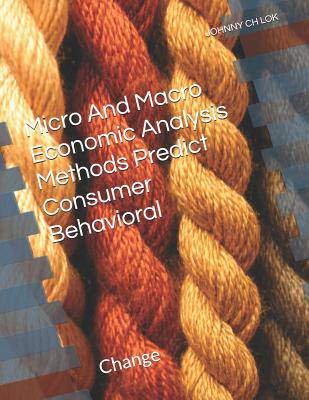
Bedankt voor het vertrouwen het afgelopen jaar! Om jou te bedanken bieden we GRATIS verzending (in België) aan op alles gedurende de hele maand januari.
- Afhalen na 1 uur in een winkel met voorraad
- Gratis thuislevering in België
- Ruim aanbod met 7 miljoen producten
Bedankt voor het vertrouwen het afgelopen jaar! Om jou te bedanken bieden we GRATIS verzending (in België) aan op alles gedurende de hele maand januari.
- Afhalen na 1 uur in een winkel met voorraad
- Gratis thuislevering in België
- Ruim aanbod met 7 miljoen producten
Zoeken
€ 46,45
+ 92 punten
Omschrijving
Chapter ThreeMicro economic assess the influence on location choices and growth performance consumption prediction.Some economists indicate idea that seen central to the development of regional science at large and to economic geography and international trade theory. In this terms of economies of specialization increase returns to scale and in the case of regional science and economic geography, economies of localization and urbanization.The questions concern: Can choose the best business location to attract consumption growth performance? Does the best destination attract consumption growth?" Two cities attract trade from an intermediate town in the vicinity of the breaking point, approximately in direct proportion to the population of the two cities, and in inverse proportion to the squares of the distances of the intermediate town" ( Reggiani, 1998).It implies some economists believe that geographic location choice factor can influence consumption growth. It is possible due to the location has many people are living. So, it brings many business chance, or the location is one the country's main in economic development location, it can attract many travelers choose to go to the location to travel. So, it has many travelling clients to prefer to consumer.However, a smaller region can still attract consumption growth, if it had good transportation system. For example, a small region may not have its own university, but inhabitants may still have access to higher education. Elsewhere accessibility measures are also need in activity location models, where access ability is the way through which the quality of the transport system influences the land use.So, it seems although the regional land is small size and far from cities, but if it can have good transportation system to provide any people to travel the small size regional land from outside cities. It is possible to bring consumption growth. However, some economists believe that distance influence relations in economics and economic geography in two ways: first, natural resources are distributed unevenly across space and second, distance separates various activities from each other. They apply " law of demand" to support their reasons.
Specificaties
Betrokkenen
- Auteur(s):
- Uitgeverij:
Inhoud
- Aantal bladzijden:
- 68
- Taal:
- Engels
- Reeks:
Eigenschappen
- Productcode (EAN):
- 9781070215846
- Verschijningsdatum:
- 25/05/2019
- Uitvoering:
- Paperback
- Formaat:
- Trade paperback (VS)
- Afmetingen:
- 216 mm x 280 mm
- Gewicht:
- 181 g

Alleen bij Standaard Boekhandel
+ 92 punten op je klantenkaart van Standaard Boekhandel
Beoordelingen
We publiceren alleen reviews die voldoen aan de voorwaarden voor reviews. Bekijk onze voorwaarden voor reviews.












